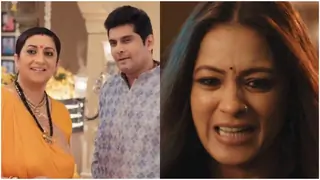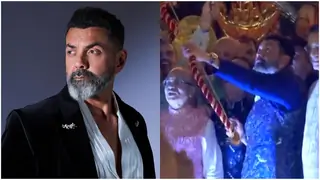TV Directors – Captains Of The Ship Or Puppets On A Chain?
A film is always known by its director because it is his vision. However television serials are never associated by their directors. Its often said that directors on television do not enjoy many liberties especially when compared to their counterparts in films.
To find out if it is true, we spoke to two directors from the television fraternity -- Ajay Sinha ('Ghar Ek Sapna', 'Astitva', 'Hasratein') agreed with our views but Ashish Patil ('Kumkum') has a different story to tell.
Ajay Sinha: "There is nothing creative left for directors to do on television."
Ashish Patil: "We have been working in this industry for long and have acquired the knowledge on how to function."
Is there any scope for directors on television?
Ajay: There is nothing creative left for directors to do on television. Earlier, there was a lot of creative space given to directors and thus we could churn out shows like 'Astitva Ek Prem Kahani'. Today, directors are just there for the execution. The creative department takes all the decision and the director just executes it. The person who is executing cannot use his sensibilities.
Ashish: I feel directors do have a lot of work and scope for creativity on television.
Do TV's infamously hectic time schedule and deadlines hamper creativity?
Ajay: Time is a major factor. Earlier, we made 'Hasratein' for four years, We would shoot for 12 days, we would work on the script for 8-10 days and after 2-3 days of editing we had time for our personal life. That was for 4 episodes a month but now we have 22 episodes in a month! Earlier we would shoot 4 to 5 scenes but today it goes upto 12 scenes a day at times.
One way out of this situation is having seasons for shows. After a season, if a show has done well, then you should have the next season after a break. This would give space for more creativity. A person would get a break to work on the show. It is not possible in today's scenario.
Ashish: Not exactly. Yes, I agree that due to the hectic schedules, there is less time for shooting. At times we shoot 7-8 scenes in a day while if the need arises we also shoot 10-12 scenes. But we have been working in this industry for a long time now and have acquired the knowledge on how to function. We do prepare ourselves well in advance of the shoot so we know exactly what to do.
The Creative Director of the show from the channel's side and the producer's side seems to take most of the calls. Why is the TV director not the final word like he is in films?
Ajay: A creative director is there because there is too much work and you need someone to overlook and see if things are working fine. If I do not feel like directing anymore, I will become a Creative Director. I will not have to shoot a lot but overlook. But the point is that you have to see the qualification of the person -- would it make sense if in a hospital I have a supervising doctor who is not even an MBBS? What would he be able to do? A creative director is very important but making a 20-22-year-old girl who has done some course from somewhere the Creative Director is questionable.
Ashish Patil: The Creative Director is the captain of the creative department whereas the director is the captain of the ship. The creative director has to discuss things with the director but it is the director who takes the final call.
Don't scriptwriters also have a vital say in television shows?
Ajay: The writers are the most important part in the creative department but attention is not being paid to writers.
Ashish: If a good writer bring in good concepts and they form a team with a good director, then certainly the product will be good.
Finally, why do directors keep changing for the same show?
Ajay: We did not have qualified and experienced people in our country. A person who was a camera attendant till yesterday has become a cameraman today. In a daily soap set-up, a director who is directing the show will be changed.
Ashish: Changing the directors is not good for the show. The problem arises when directors fail to understand what the channel or the production house wants from him -- then they have to change him.






















